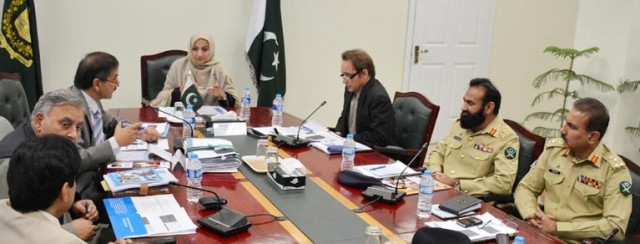The Ebola crisis & Pakistan
Were Ebola ever to enter Pakistan, it would find an environment highly conducive to its spread. We hope it never does

Thus far, no nation or entity has put even a tentative figure on the number of potential fatalities from the current outbreak of Ebola, and there is what comes close to low-level hysteria in the way it is sometimes being reported around the world. Both the UK and the US in the last week have issued warnings to the international community that there is going to be a substantial loss of life in West Africa (so great as to have the potential to trigger state failure in the worst scenarios); and that the threat to the rest of the world was even greater than that in the African continent unless financial and medical responses to the outbreak were significantly intensified.
Strong words indeed, and the World Health Organisation (WHO) has now admitted that its response in the early stages of the crisis was inadequate. John Kerry, the US secretary of state, was almost apocalyptic in his vision, saying that Ebola could become a scourge like polio or HIV/AIDS. He cited the failure of the international community to raise the $1bn that the UN had called for and the limited response from countries such as China and Russia as an underlying problem. $1 billion may seem like a considerable sum, but when viewed against the cost of the war in Afghanistan, which is currently put at $6.6 billion per month, it is little more than loose change. To date, the UN has received about 38 per cent in pledges towards its $1 billion target. However, Medicins sans Frontieres has cautioned that international pledges are having no impact on the spread of the virus and will not for perhaps a further month or a month-and-a-half.
As the world attempts to marshal its resources, what of Pakistan? Ebola may seem remote, but Pakistan has troops serving in UN peacekeeping missions in some of the countries affected, and there is a small but significant Pakistani workforce that travels to and fro to the home country from West Africa. The risk may be low, but it is impossible to ignore, and we do so at our peril. The Punjab Chief minister Shahbaz Sharif at a meeting on October 17 said that flights incoming from affected countries will be monitored and passengers screened. A representative of the WHO also briefed the meeting and a steering committee has been set up to determine national policy and response.
For now, this may be sufficient, but it has to be weighed against a background of a public health system that is broken in large parts of the country, has failed completely to contain poliomyelitis, measles and all the strains of hepatitis, and allowed TB to remain firmly embedded as a national killer. Were Ebola ever to enter Pakistan, it would find an environment highly conducive to its spread. We hope it never does.
Published in The Express Tribune, October 19th, 2014.
Like Opinion & Editorial on Facebook, follow @ETOpEd on Twitter to receive all updates on all our daily pieces.














COMMENTS
Comments are moderated and generally will be posted if they are on-topic and not abusive.
For more information, please see our Comments FAQ